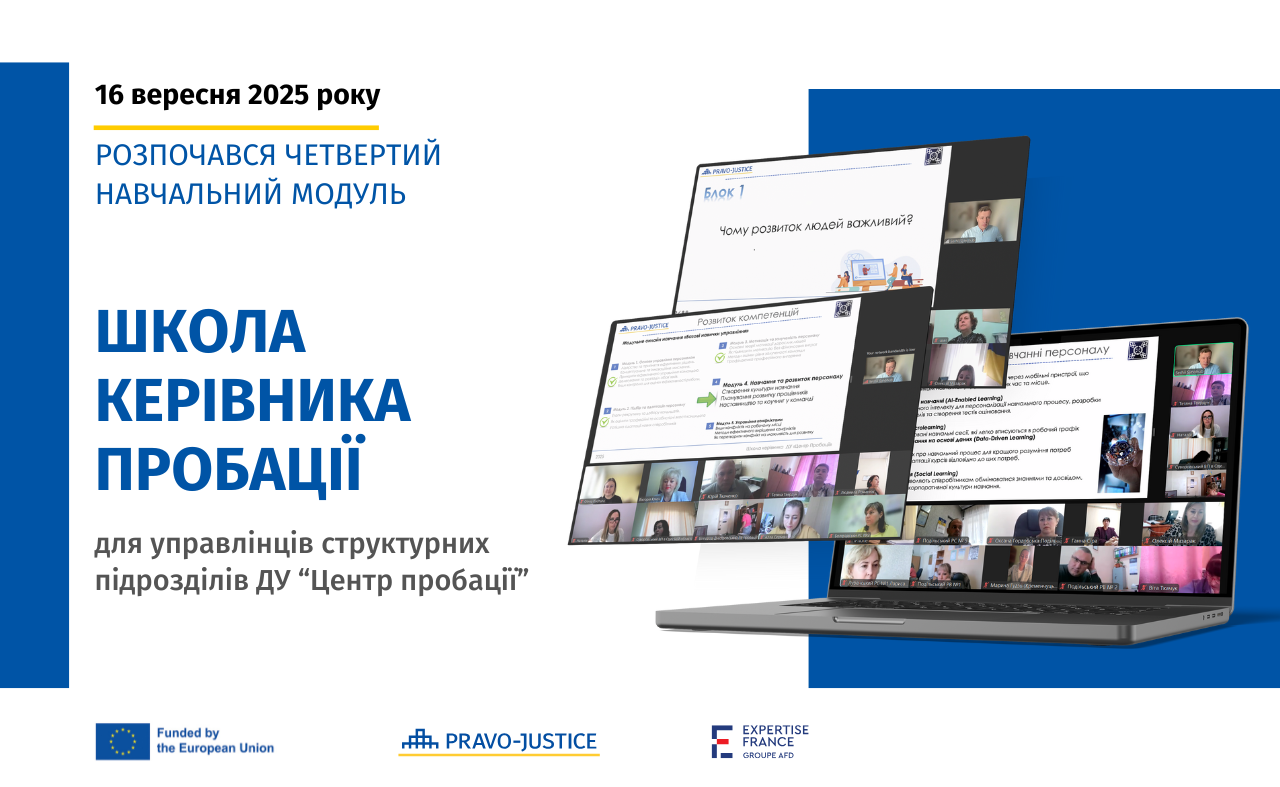Probation Manager School Launches Fourth Module on Staff Training and Development

On 16 September, as part of the training initiative “Probation Manager School” implemented by EU Project Pravo-Justice in partnership with Probation Centre, the fourth training module entitled “Staff Training and Development” was launched. Over a month, about 500 managers of probation agencies from all regions of Ukraine will participate in the module.
The main goal of the module is to give probation managers a holistic view of staff professional development processes: from creating a culture of continuous learning to implementing modern HR tools and incentives.
“Training and development are the driving factors for human resource management. The manager’s objective is to make training an integral part of the daily routines in the team. Performance depends not only on technological solutions, but also on staff flexibility, agility, and professionalism,” emphasised Serhii Synohub, national expert of EU Project Pravo-Justice, module developer and lecturer.
At the training, the expert emphasised that staff development is directly linked to reducing staff turnover and improving the performance of both newcomers and seasoned professionals. Investing in training helps build a talent pool and nurture prospective leaders, strengthens corporate culture, and boosts staff engagement.
The module participants explored current trends in L&D (Learning & Development), including mobile and microlearning, using AI, social learning, environmental education, and personal development paths.
“Today, people learn differently: through microlearning, smartphones, and by learning from their colleagues. The probation manager’s objective is not only to organise this process, but also to show by his/her own example that learning is valuable and career-enhancing,” noted Serhii Synohub.
The module featured a dedicated presentation of the effective 70-20-10 learning model, which combines learning from experience (70%), learning from others and mentoring (20%) and formal learning (10%). Participants also acquired practical tools for identifying staff learning needs and effective learning incentives.
The training placed particular emphasis on the manager’s role as a catalyst for development. After all, unlike external experts, the manager best understands the team’s real day-to-day tasks, can promptly identify knowledge gaps, and enjoys greater trust from staff. According to Serhii Synohub, a manager should be an example of continuous self-development, fostering a culture of learning in the team.
“In an atmosphere of continuous development, people find learning easy and enjoyable. The manager’s job is to make learning a natural part of the job rather than an extra burden,” the expert emphasised.
Viktoriia Kliuch, Head of the Human Resources Department at the Probation Centre thanked EU Project Pravo-Justice for organising the Probation Manager School.
“This format is extremely important since a modern manager must not only run daily affairs effectively, but also ensure the continuous staff development and training. The probation service’s performance and its success in meeting strategic goals depend on how well managers support the professional growth of their staff,” said Viktoriia Kliuch.
Reference.
Probation Manager School is a training programme that aims to nurture a new generation of probation managers in Ukraine equipped with modern HR management tools and capable of working effectively in a rapidly changing environment. The programme consists of five training modules:
- fundamentals of staff management (leadership, decision-making, teamwork);
- staff recruitment and onboarding;
- staff motivation and engagement;
- staff training and development;
- conflict management.
Participants will take a test at the end of each module to assess their knowledge and skills, and those who pass the final exam will receive certificates. The program is set to conclude this November.